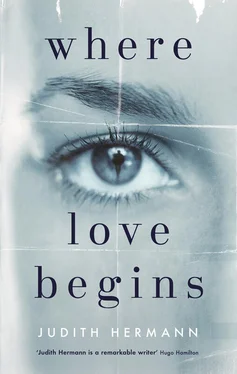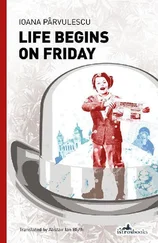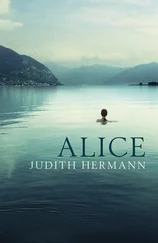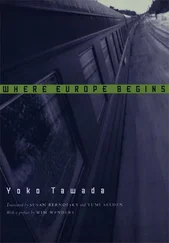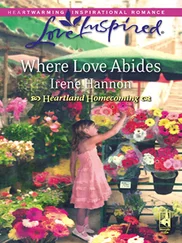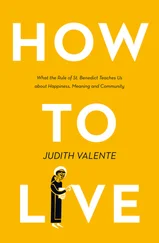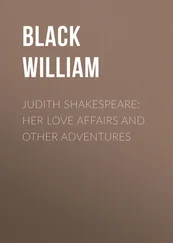*
Mister Pfister doesn’t ring again.
*
He rings the bell that night at two a.m., and Stella is instantly awake. She gets up and goes from the bedroom to the little room. She is awake because she has been waiting.
The street is dark. The storm has moved on; the street lamps are already out. In spite of that Stella can see Mister Pfister. This time he’s walking in the other direction, home, and she can hear his measured, imperturbable steps in the night-time silence. For a long while still. She thinks she can almost hear Mister Pfister’s garden gate slamming shut behind him. Where’s he coming from at this hour.
The week after Stella and Ava return from Jason’s construction site the weather turns hot and summery. Twenty-eight, thirty, thirty-two degrees. Stella’s alarm clock rings at five thirty. She turns it off and stays in bed, lying on her back, awake in her empty-without-Jason bed, feeling the morning coolness like a touch, precisely because it is so brief. At six o’clock in the morning the grass in the garden is damp and cold. A thrush perches in the hedge. The morning sun casts Ava’s sandpit in shade so deep you could grasp it with your hands; at the edge of the meadow the first poppies are beginning to bloom. The sound of cars slowly rolling by the house, people on their way into the still-uncertain day.
*
Ava sleeps under a sheet; in the morning she lies there without the sheet, her arms stretched out in abandon, hair sweaty. The warm air enters the house like a guest. Stella breakfasts in the garden with Ava. She drinks tea, watching Ava engrossed in eating her porridge with berries, swinging her legs, then pressing her feet into the grass. All I need to wear is a dress, Ava says, serious. Just one single dress, nothing else.
At the kindergarten Stevie runs towards Ava, an expression of worried joy on his face; at any rate that’s what it seems like to Stella. He is thin, has a fox fur hat on his head in spite of the heat, and doesn’t give Stella even a glance. She holds Ava tight and says, Till later, Ava, till then. But Ava pulls away, has already turned away.
*
And where were you, Esther says. Where were you the entire weekend. You’re certainly not the brightest but really, the other girls from your awful nursing service are even more stupid; they’re all atrociously stupid.
Stella doesn’t answer Esther when she’s in this frame of mind, doesn’t talk to her at all. She opens the windows and closes them again; lowers the Chinese rice-paper blinds, puts fresh sheets on the bed, and changes the flowers in the vases; she washes strawberries, cuts them up and sugars them.
I won’t eat that, Esther says. I don’t eat anything any more; I don’t eat any of that stuff. Esther is sitting in her wicker chair, a wrinkled queen in sand-coloured underwear; she looks like an old, stubborn child. Her hair stands on end, her face glows. Stella lifts her into the wheelchair; for one moment they stand in a tight embrace in the middle of the room, Esther in Stella’s arms, an invitation to the dance. Stella feels Esther’s breath on her collarbone, feels Esther’s fragility. She pushes Esther into the bathroom, lifts her onto the edge of the bathtub, puts Esther’s feet into the tub and turns on the cold water; she washes Esther; then she sits on the toilet bowl and watches as Esther, eyes closed, lets the water run over the insides of her wrists, her arms, her knees. As if she were at a spring.
All right now, Esther says. Where were you. How was it. It’s easy to see that you have some sort of problem. Tell me about it.
Stella has to laugh at this. She believes that Esther has cheated her way all through life with this faked interest in others whom she doesn’t really want to know anything about, not about Stella and not about anyone else either. She is interested, but not in the details, more in the general, the overall picture. In world politics. The outcome of wars. War, in and of itself.
I was away in the country, Stella says. With my husband and my child. We went swimming. Everything’s OK. I’ll give you five more minutes here; then we have to go back to your room. You’re going to eat the strawberries; I’ll force you to.
Oh, what the hell. Go on, be like that, Esther says dully. Your husband and your child. I also had a husband and several children, and they’re all gone. Up and away. Life is horrible; have you already discovered that?
She pushes Stella’s hands away. Washes her face and neck by herself, still sitting on the edge of the tub, naked, an archetype.
*
During the lunch hour Stella cycles over to Paloma’s office. Paloma has turned the cooling fan on the windowsill to the highest setting; a vigorous, artificial breeze blows through the room. In addition, Paloma is also using a paper fan to fan herself; she’s barefoot, her tanned skin is shiny. She points to the chair in front of her desk; Stella obediently sits down. Paloma looks at Stella quizzically, then she folds up her fan and says, Well Jason isn’t here, as if there were some connection between Stella’s presence and Jason’s absence. This isn’t entirely mistaken. But it isn’t correct either.
No, Jason has left again.
For how long this time, Paloma says, not waiting for an answer. She says, Let’s go outside and put our feet in the fountain. Let’s watch the sparrows.
She locks the office door, and Stella follows her through the stuffy foyer and out to the park. Dazzling light. Paloma is still barefoot and Stella takes off her shoes when they reach the fountain and sits down on the rim next to Paloma; she puts her feet into the water, supporting herself with her hands on the hot stone. No wind; the trees along the avenue stand motionless. Stella thinks she hears the kindergarten children’s voices at the far end of the park. She’s afraid Ava might come by, hand in hand with Stevie, in a column lined up two by two for a walk. She thinks again that everything in her life is too close together. Work, house, kindergarten. She longs for distances, distances to be covered; only Jason, Stella thinks, is always far away, too far away for me to reach him.
The sparrows bathe in the fountain, at a safe distance. Paloma pushes up her dress, submerges her wrists in the water; Stella can see little gold particles glittering in the bends of her elbows. She thinks of Esther on the edge of her bathtub, of Esther’s dry skin, her sly look. Esther would have had something to say about the little gold particles.
I’m going on a trip this year, Paloma says. I’m staying at the summer house for a week; then I’ll close it and go to visit my mother, driving on from there by car simply straight ahead until I arrive somewhere. Wherever that is. That’s my plan.
They both shade their eyes against the sunlight and look down the park path as if something were coming towards them. The foliage is now dense and peacocks are calling from their hiding places. Stella imagines Paloma’s mother, an old woman on a balcony in a development where, fifty years ago, there were many children and where today the clothes lines neatly stretched between wooden posts are empty. Perhaps Paloma’s mother lives like that. Perhaps she lives completely differently.
Where do you sleep when you visit your mother.
I sleep on the sofa, Paloma says. I sleep on the sofa and wake up at night because the television set crackles. The housing of the TV crackles. Do you know that sound? Unpleasant. It’s unpleasant.
She shakes her head, stands up and climbs out of the fountain; her footprints evaporate quickly from the stones.
I have to get back to work. The phone is ringing; I can hear it even out here, probably only imagining it. But the old people go haywire in this heat and die like flies. Like flies. Come inside with me. Stay with me a while until you have to go to Julia.
Читать дальше
